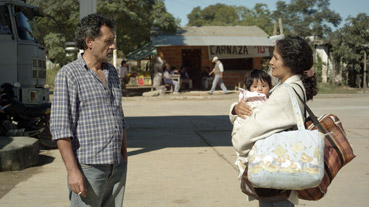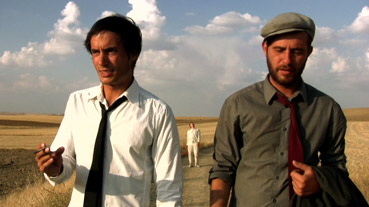|
After, 16 days of cinema and debate, during which 207 films were screened, we can finally pause, panting, to take stock of the 55th London Film Festival. Audience attendance figures were up, once again, to 133,000, and the quality and range of films presented was as impressive as ever. While there were, inevitably, many disappointments, this was another solid, satisfying year for the festival, one that can only have consolidated its international reputation. Over the coming days, I will highlight some of the more interesting films from the festival. I'll begin with two of this year's surprise hits, both assured feature debuts, a brace of markedly different but equally enchanting road movies: Pablo Giorgelli's Las Acacias and Jonathan Cenzual Burley's El alma de las moscas/The Soul of Flies
At the festival's annual awards ceremony, Terry Gilliam presented Argentine director Giorgelli with this year's Sutherland prize "for most original and imaginative feature debut." A tender, deeply moving film that takes audiences on a gentle journey to the heart of love, this soulful slice of slow cinema has already earned Giorgelli the Caméra d'Or and Young Critics' awards at Cannes. Las Acacias also won the Premio Horizontes prize for Best Latin American Film at the San Sebastián International Film Festival, and a Film of the Year award at the 20th Biarritz Film Festival. It is a worthy winner of this additional prize.
Rubén (Germán de Silva) is an enigmatically taciturn long-distance lorry driver who regularly transports timber from Paraguay to Buenos Aires. On this occasion, he has reluctantly agreed to carry passengers too, as a favour to his boss and for a fee. When he picks up single-mother Jacinta (Hebe Duarte) and her cherubic five-month-old daughter, Anahí, he can barely contain his displeasure. As the film unfolds, though, we watch in delight as Rubén's frozen heart melts, warmed as it is by the child and her mother.
We learn that Rubén has an eight-year old son who he hasn't seen in eight years and that Jacinta is returning to relatives in search of work, but little else, because the world-weary man and understandably wary woman exchange very few words. The film's lack of diagetic sound hugely enhances its force. The motto of the silent order of monks in Philip Groening's Into Great Silence is: "Only in complete silence can one start to hear. Only when language resigns can one start to see." Those words might usefully be applied to Las Acacias. In keeping with slow cinema's tendency to linger long on faces and moments, movement and landscape, the two come to know each other through small gestures and increasingly sympathetic glances, while the camera largely remains fixed in the driver's cabin as the Pampas grassland streams by outside.

As the initially tense atmosphere between Rubén and Jacinta relaxes, they begin to look more, or less like a couple. At one stage, the three travellers are actually taken for a family. Rubén seems irritated by this, but, if the thought of what might be doesn't plant itself in his mind, it certainly enters our minds as we watch. In another scene, when they pause for a picnic on a riverbank and are joined by a friendly dog, they look like every inch the happy family. The understanding, trust and unspoken affection that gradually develops between Rubén and Jacinta is such that, by the time the film reaches its tantalising climax, we are willing them to embrace one another and seize the opportunity for the fresh start we feel they deserve.
As we join the film's bruised characters on their emotional journey, we are also, unwittingly, sharing the director's own. The idea for the film was triggered by the sight of a lone woman weighed down by bags, waiting at the side of a road and Giorgelli says that he made Las Acacias as a meditative, therapeutic response to his own loneliness and inner anguish. In a short, painful period, his father died, then his first marriage and the Argentine economy collapsed simultaneously. All of which left him alone, unemployed and nearly homeless. Giorgelli's sense of loss permeates the film but so, too, does his joy at subsequently rediscovering happiness with his second wife, the film's editor Maria Astrauskas. As Giorgelli says: "The film is about solitude, but it is also about the possibility of being reborn."
Films rooted in deeply felt personal experience often have an atmosphere and intensity all their own and Las Acacias is a no exception. Flawless acting, understated cinematography and unhurried editing combine to produce a subtle, slow-burning film that strides sure-footedly towards its moving climax, sidestepping sentimentality and melodrama in order to stir our deepest feelings. It moves straight from the London Film Festival to the Leeds International Festival, opens in selected cinemas from 4 November, and can also be seen during an extended run at the Institute for Contemporary Arts in December. Do try to catch it.
Given that Giorgelli's film owes much to the unconventional conventions of slow cinema in general, and to the work of his compatriot Lisandro Alonso in particular, Jonathan Cenzual Burley's poetic comedy The Soul of Flies has an even greater claim to originality than Las Acacias. Canzual Burley's more chaotic and colourful film shimmies across the screen, bursting with life, and it is little wonder that it is less polished and precise than Las Acacias, for it was made with just one camera and a crew of seven. The old adage that necessity is the mother of invention definitely applies to this wonderful, witty gem of film, which displays great zest and considerable panache.
As the film begins we see Everisto de la Sierra (brilliantly played by the director's grandfather), tending to a stamp collection that he will subsequently discard. The narrator tells us that de la Sierra didn't wish to own stamps but, rather, to travel to the countries of their origin and experience life to the full. This he does, siring two sons along the way. Towards the end of an adventurous life, he writes to those neglected sons, inviting them to his funeral, aware that he has given them nothing in life but determined to give them each a brother at least.

So it is that the half-brothers, Miguel (Javier Saéz) and Nero (Andrea Calabrese), finally meet, at a deserted railway station through which no trains pass, on their way to the funeral of the father they never knew. Before accepting a ride in a car that breaks down, Nero phones ahead to warn their mother (brilliantly played by the director's grandmother) that they will be late for the funeral. She takes the call on a public payphone attached to a church in the middle of nowhere, and then proceeds to grill Nero about what he's eaten that day. She promises to wait by the phone for news of their progress and have food ready for their arrival. She then hangs up and calls for a chair. That scene is a typical of the film's black comedy but much of its humour derives from the brothers' squabbles.
They are as different as chalk and cheese. Miguel is a buttoned-up big-city-cynic while Nero is a loose-limbed, freethinking optimist. Their differences of opinion on anything and everything are delivered brilliantly for comic effect. Their journey across the ochre, orange and brown flatlands of the Castillian Meseta recalls Don Quixote, but the film's tone and structure owe more to Gabriel García Márquez's One Hundred Years of Solitude and Emir Kusturica's Black Cat, White Cat. The brothers themselves, meanwhile, are straight out of Ionesco and Beckett: characters trapped in a meaningless and godless universe but struggling gamely, against the odds, to communicate with one another and make sense of existence.
As in Las Acacias trust overcomes tension. The brothers gradually grow fond of each other, and, after they reach the funeral with the help of a likeable band of brigands, they finally set off in search of the woman of Miguel's dreams. Mere comparison and plot synopsis cannot do justice to the zingy, zany originality of the film, nor to the intelligence and joie de vivre that emanates from it. The performances of the predominantly non-professional cast are as effective as they are enthusiastic, the camera brilliantly catches the beauty of the director's native Salamanca - its grain fields, ancient churches, open skies and stunning sunsets, but the soundtrack must be singled out for special praise.
Music drives The Soul of Flies. Andrea Calabrese is clearly as talented a musician as he is an actor, and his self-composed songs for the film are lovely, but Tim Walters' score takes it to a different level. At times Walters, an English musical-magician also based in Brighton, deploys acoustic flamenco-and-fado-tinged guitar to generate an authentically Iberian atmosphere. At other times he plays accordion to produce hypnotic rhymes reminiscent of Mihály Vig's scores for Béla Tarr. Walters floored me when he confessed that he'd never heard of Tarr, but surprised me more when he told me that he learned to play accordion in weeks, especially for the film. Within the festival only the soundtrack of Terence Davies' The Deep Blue Sea comes close to matching Walters' magnificent musical accompaniment. If ever a film deserved the full t-shirt and soundtrack marketing treatment The Soul of Flies does.
Inevitably, the film's lack of money was at the forefront of my mind when I interviewed Cenzual Burley, who was not long back in Brighton, where he lives, after promoting his film at the Mill Valley Festival in California. He spoke of a happy set and a tight budget: "We had great fun. It was, as they say, a real team effort. I already owned the camera and we all stayed at my grandparents' house in Salamanca, so we made the film for what it takes to provide food . . . and beer (he laughs) for seven people for three weeks. Post-production costs – especially the sound stuff and the ten weeks I spent editing it - pushed the budget up, but we still did it for the price of a decent car. If I make my money back I'll be happy." Which is to say, this delightful, skillfully executed film was made for next to nothing in the distorted economics of today's films industry, in which £5 million is considered a small budget. The Soul of Flies is a case study in how far a happy, united crew and a daring, improvisational approach can take film. Recent film history in particular is littered with rotten films allocated budgets a hundred times larger with a thousand times less soul and sparkle.
The film tells it story with such brio and verve that it comes as little surprise when Cenzual Burley tells me that his influences were primarily literary not cinematic: "I always wanted to be a writer. I still want to be a writer! My biggest influence was probably Marquez's magic realism. I tried to tell a story that captured the magic of the Spain of myths and legends, dreams and possibilities." We drift into discussion of political dreams: "I feel that memory is embedded in the Spanish landscape. When I say that Everisto de la Sierra fought in the war, Spaniards will understand what I mean; for them ‘the war' means the Civil War. It still divides the country." Although he thinks often about the Spanish past, he has no intention to cover it in film. His next two film projects are, he says, all but written in his mind and are potentially darker and funnier than The Soul of Flies. I will say no more than that they involve a failing circus and a dying village respectively. Anyone who watches this thought-provoking, hugely enjoyable romp of a road movie will hope that he gets decent budgets for those projects and that his ideas come to fruition sooner rather than later.
 |
|
|